The summer and winter are a thriving time for HVACers. People need their ACs and heating systems in top shape, lest they melt or freeze. But what about those in-between times when the weather is nice?
This in-between time is called shoulder season, and it's the achilles heel of HVAC businesses.
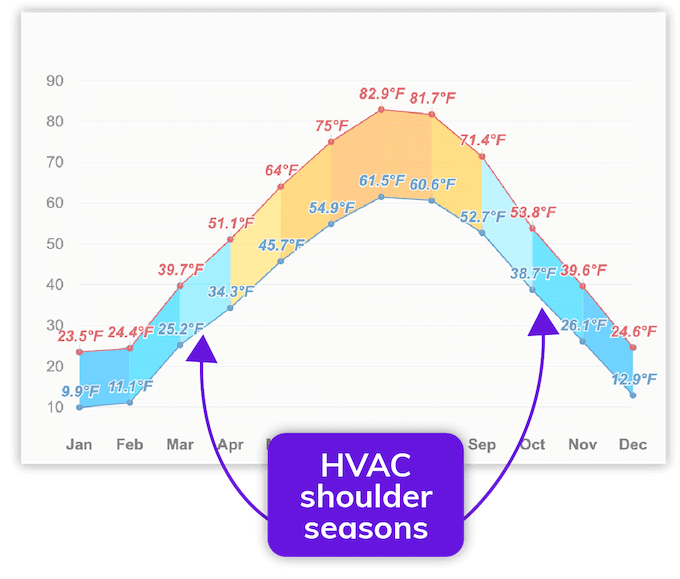
To help you keep a steady stream of revenue coming in all year round, this post is going to cover how to prepare for shoulder season and what to do if you didn't.
Table of contents
What is HVAC shoulder season?
HVAC shoulder season occurs when the weather is nice, people have their windows open, and aren’t in need of any heating or cooling services.
Great time for homeowners...

...not a great time for HVAC businesses.
As you’d expect, shoulder season happens during the spring and fall, and even during stretches of nice weather during summer and winter.
The problem with shoulder season
Shoulder season never fails to sneak up on HVAC businesses. When jobs are thriving, you are too busy, and perhaps also feeling just a little too invincible, to stay on top of leads and prospects or plan for slower months.
Then those slow months come and:
- You don’t have contacts in your pipeline.
- You don’t have a plan in place to drum up engagement.
- You end up scrambling—mining your database to find aged quotes and lowering prices to make your numbers.
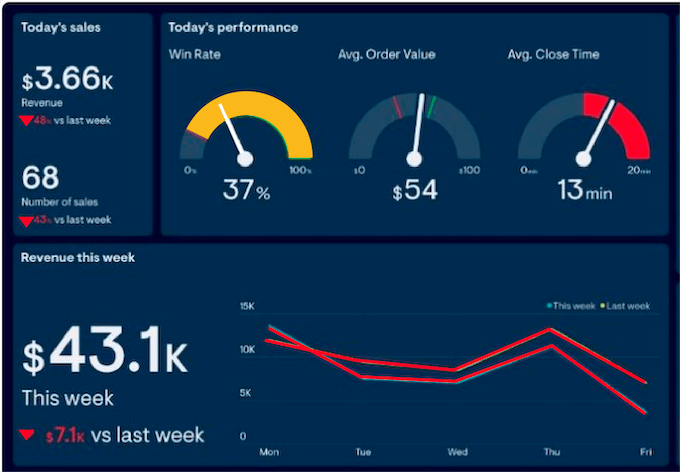
Effective marketing requires creativity and careful thought, and both of those go out the window when you’re stressed (and the window is wide open because it’s shoulder season).
How to get ahead of shoulder season
The best way to combat shoulder season is to get ahead of it. Here are some things you can do to be prepared:
1. Generate demand through education
The jobs you’re aiming to land during shoulder season are typically going to be tune-ups or replacements to help your clients prepare for the extreme weather ahead.
But in the heat of summer, consumers aren’t going to be thinking about tuning up their furnaces. And vice-versa during the throes of winter.
That’s why you need to educate them—early and often.
- During the summer, educate your customers on the importance of checking in on their furnaces and heating systems early (aka during the fall) before the cold weather hits (winter).
- During the winter, educate them on why they need to get their air conditioners serviced early (spring) before the heat cranks up (summer).
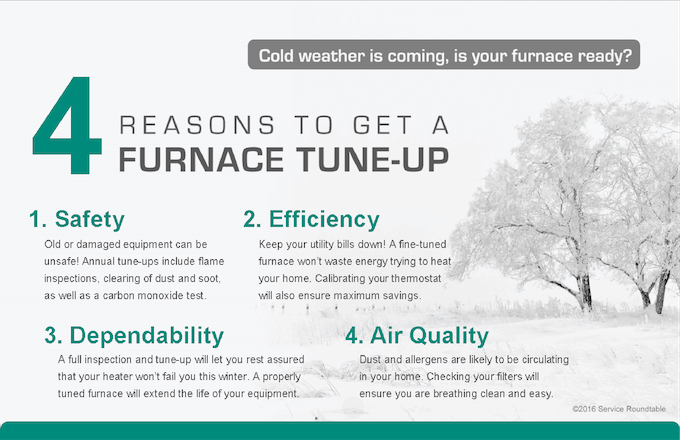
Image source
And notice that I said often. Use content and promotions to consistently reinforce the importance of tune-ups and replacements so that you can win as many jobs ahead of time as possible, but also to warm up those customers who will wait until shoulder season to buy.
Important points to convey:
- Avoid emergency or after-hours services, which can sometimes be more expensive.
- Side-step long wait times during the busy season
- Prolong the lifespan of their existing appliance
2. Promote your maintenance program
This is a good way to prepare for shoulder season no matter what time of year it is. Some tips on promoting your HVAC maintenance program:
- Create visually appealing assets and calls to action to use on your website, social media profiles, and ads.
- Write blog posts and ebooks educating your audience on the importance and cost savings of maintanence.
- Create an easy-to-read, polished service contract that wins customer trust and gets the signature.
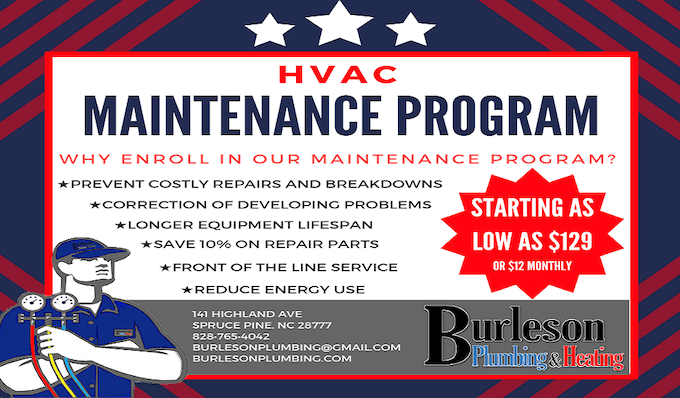
Image source
3. Run nurture campaigns
Unless you're using automation, it's pretty much impossible to diligently keep up personally with every lead, prospect, and customer. They inevitably fall through the cracks. The good news is, this means you likely have an untapped source of revenue.
Take a look at contacts in your database that you haven't contacted in a while and try out a nurture campaign.
Depending on their status in your funnel, you might reach out with a personalized follow up or you might enroll them into a campaign with educational content or a special offer.
This way you can feed your pipeline a little extra so you can have jobs booked during slower months, or so you can make enough money during the busy season to compensate.

4. Start an automated follow-up process
There are all kinds of ways to prepare for the slow season, but they all require outreach. And whether that's to existing customers, new leads, old leads, or prospects, there's one thing that HVAC sales reps always drop the ball on: follow-up.
They give up after one or two attempts—which is far too early! Consumers today may take anywhere from 5-11 touches before they respond.
With automation, you can put your outreach and follow-up on autopilot.
With Hatch, for example, you can create audiences based on any criteria in your CRM. In this case it’d be quoted prospects based on quote date, service of interest, location, and any other way you want to segment.
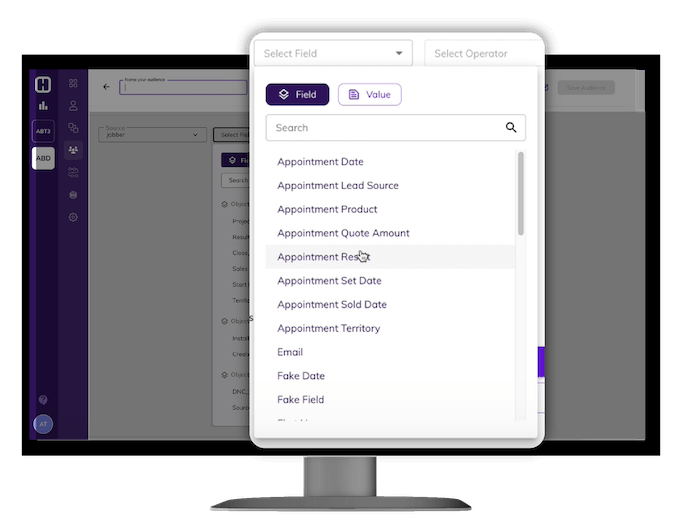
Then you create a series of emails, texts, and voicemails to fire out to the appropriate audience at the cadence you set. The messages will continue to send until you get a response, at which time you can jump in and engage.
With tailored messaging and diligent follow up, you ensure that none of your efforts fall through the cracks and you maximize your response rates.
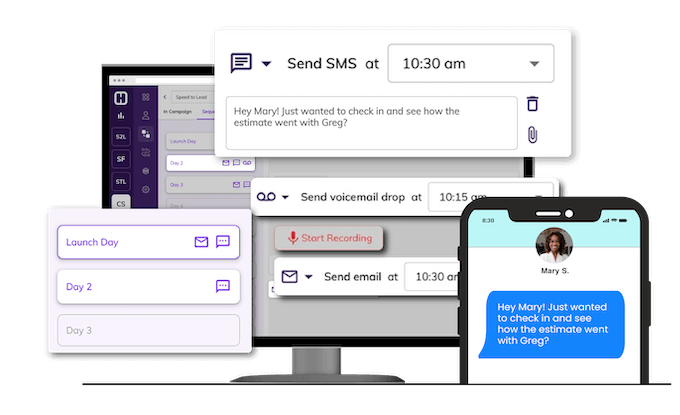
You can learn more about automating your sales follow-up here.
5. Look at your conversion rate on new leads
This is not so much a way to prepare for shoulder season as it is a way to maximize success during the busy season.
When the weather is extreme and you have a higher volume of leads coming in, pay attention to your conversion rates on those leads. What percentage of those leads are converting into appointments, and what percentage are converting into sales?
If your lead volume is going up but your conversion rate is declining, this means you’re not really benefiting from the increased lead volume and are actually missing out on appointments.
If this is the case, you may want to look at automating your lead outreach.
With Hatch, for example, you connect to your lead sources and create a series of emails, texts, and voicemails that will automatically fire out to new leads until you get a response. Then you can jump in and set the appointment. This ensures you’re engaging every lead and maximizing your conversion rates.
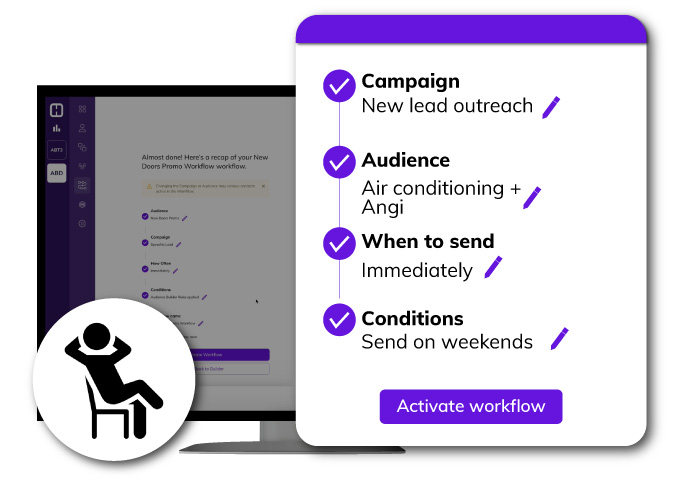
More clients means more revenue to help offset the shoulder months, as well as more clients you can reach out to for tune-ups and maintenance contracts during shoulder months.
You can learn about how to automate your lead outreach here.
What to do when you’re caught in shoulder season
Is it shoulder season right now as you read this guide? Are you stuck upstream without a paddle? Here are some tips to help you make it through until the weather turns back in your favor.
6. Rehash old quoted prospects
If you weren’t able to keep up with all your leads and quotes during the busy season—first, read the last few points above, and second, there may be some follow-up opportunities in store for you.
Prospects drop off the map for more than one reason (i.e. it's not always because they went with a competitor). Sometimes, and especially given how far they made it with you in the past, all it takes is an email, text, or phone call to get them back in the running.
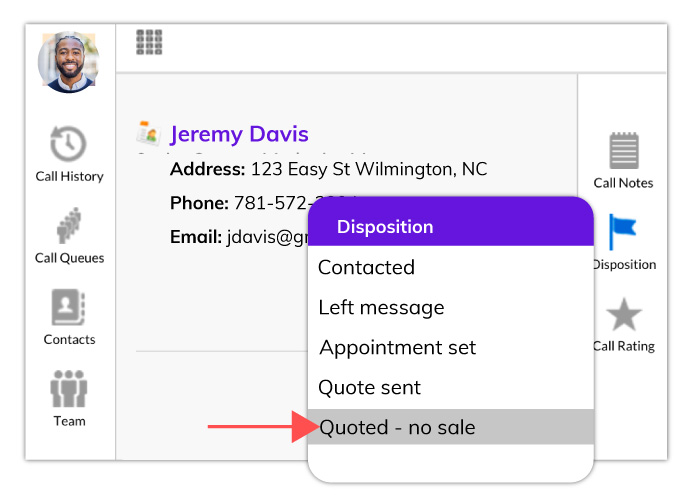
Segment out your database into quoted prospects from 30, 60, and 90 days ago and reach out. Keep it short and sweet. For example:
Hi [Name],
[Name] here with [Company]. We were in touch last month regarding [service] —are you still interested? Let me know either way. Thanks!
[Signature]
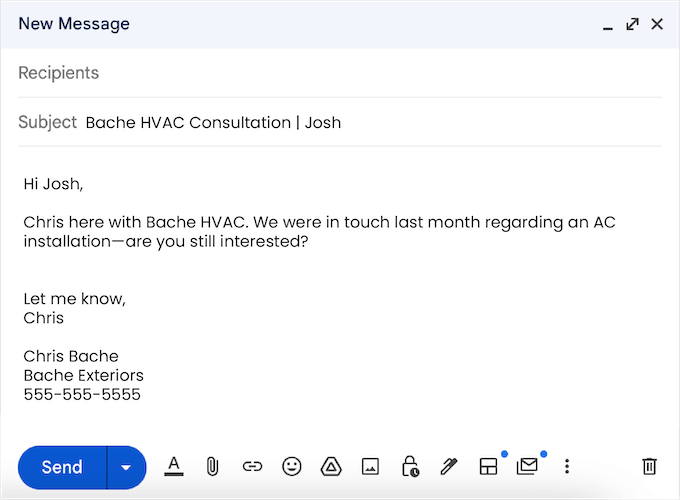
And if you're not automating it, don't forget to follow up until you get a response!
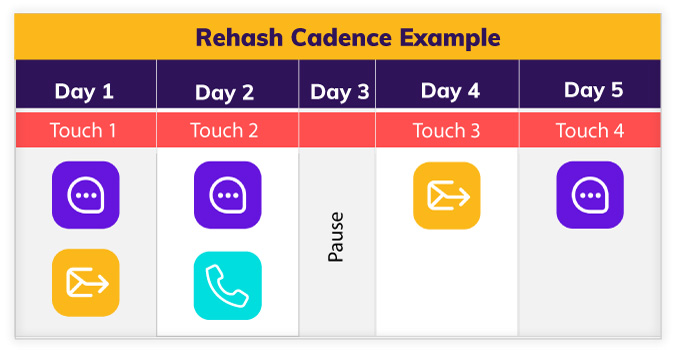
7. Catch up on housekeeping
If business is slow and you're not able to ramp up your clientele, use the time to take care of other aspects of your business, from. For example:
- Inventory your equipment
- Get your vehicles serviced
- Train your employees/get caught up on certifications
- Get caught up on HVAC blogs and associations
8. Spruce up your marketing
In addition to checking in on your operations, do an audit of your current marketing and lead generation efforts and see what needs to be adjusted, removed, or added on. For example:
- Update any stale marketing collateral
- Check in on your ads and make optimization
- Respond to Google reviews
- Update your social profiles, listings, and Google Business Profile
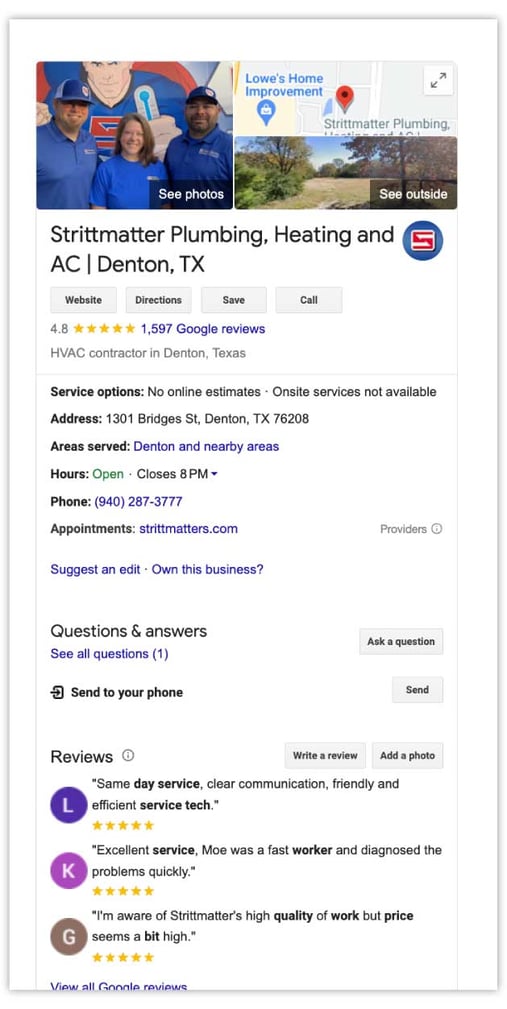
9. Run a promotion
If you're low on leads and sales, try running a discount or promotion.
Some marketing tips for ya:
- The offer needs to be especially appealing during shoulder months when people aren't thinking about their HVAC needs.
- Use a free design tool like Canva to create appealing coupons or mailers.
- Use your social channels, paid social ads, and Google ads to get the word out about your offer.

Image source
10. Expand your services/service categories
No, this doesn't mean starting an entirely new line of service, but rather offering adjacent services that you may already be qualified to provide, like ceiling fan repair, for example. Take a look at the categories and subcategories on listing sites like Google Business Profile and see if you can capture any additional leads through expanding your categories.
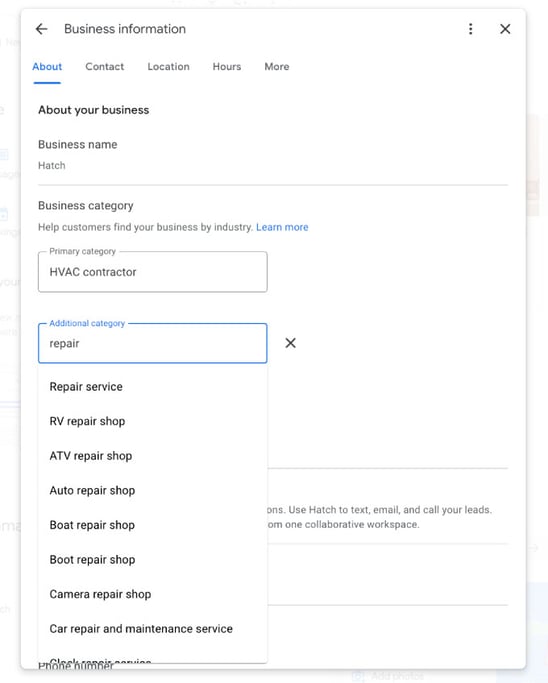
Don't lose revenue during shoulder season
The bad news is, shoulder season is unavoidable and happens twice a year. The good news is, no matter what time of year you're reading this guide, there's a strategy in here that will help you maintain revenue. To recap:
Here are some ways to get ahead of shoulder season:
- Generate demand through education
- Promote your maintenance program
- Run nurture campaigns
- Start an automated rehash process
- Look at your conversion rate on new leads
And here's how to survive shoulder season when it hits:
- Rehash old quoted prospects
- Catch up on housekeeping
- Spruce up your marketing
- Run a promotion
- Expand your services/service categories